



The squadron formed at RNAS Lee-on-Solent on April 8th 1940 as an Advanced Seaplane Training Squadron, Lt. Cdr F. E. C. Judd in command. Equipment included Walrus amphibians, Seafox and Swordfish Seaplane; after completing a conversion course successful trainee embarked in the Seaplane Carrier HMS PEGASUS for the catapult training phase before passing out.
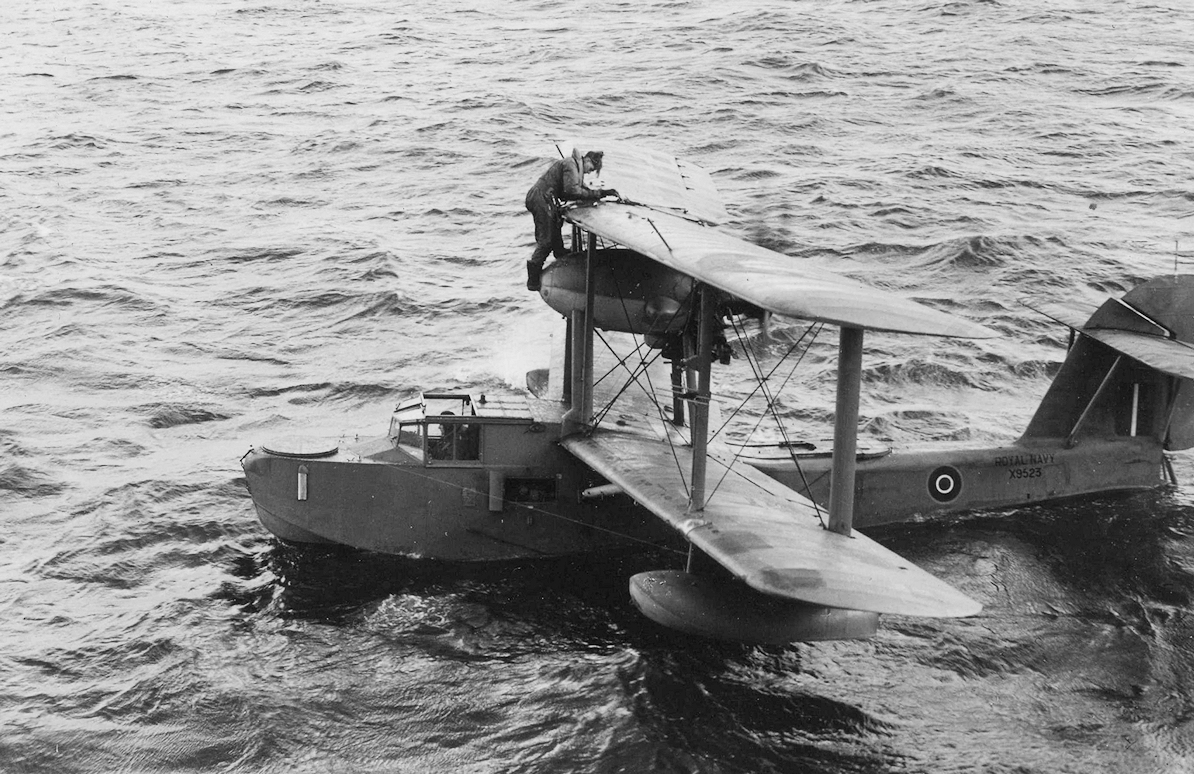
The Supermarine Walrus amphibian.
After only a short time of operations the squadron was relocated to RAF Pembroke Dock in South Wales on July 3rd; Lt. Cdr H. L. McCulloch, assumed command of 764 on July 16th.
Training continued but from August the squadron was redesignated as the Seaplane Flying Training Course Part II - Advanced Seaplane training; trainees arrived having complete Part I conducted by 765 squadron at RNAS Sandbanks. Most of the Seafoxes were handed over to 765 squadron in November 1940. the squadron began operating from another site up river at Lawrenny Ferry. This site was being developed as an RN establishment and the squadron’s Walrus aircraft moved there on October 4th but remained attached to RAF Pembroke Dock; the Swordfish floatplanes had been withdrawn in September. Lt. Cdr (A) H. Wright RN, took over as commanding officer on October 17th.
The new facilities at
Lawrenny Ferry commissioned as an RN Air Station under the control of
RNAS Lee-on-Solent, HMS DAEDALUS
on February 1st 1942 and the squadron’s detachment at RAF
Pembroke Dock ended. It is believed that the commanding
officer of 763 also assumed the role of officer-in-charge
RNAS Lawrenny Ferry.
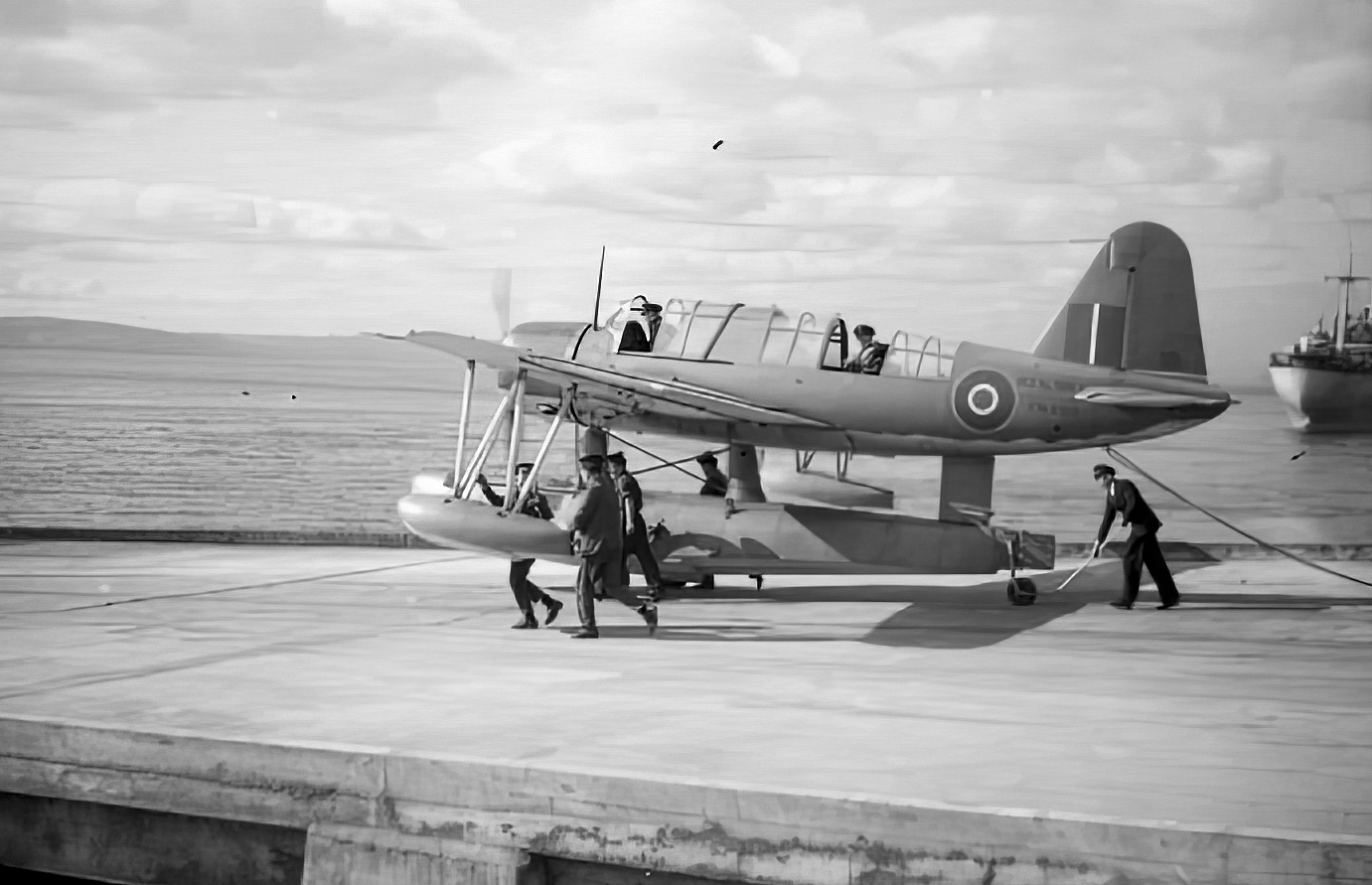
Example of the Vought-Sikorsky Kingfisher in RN service. © IWM (A 19568)
Attrition amongst the Walrus complement was also fairly high, there were 5 incidents during 1942: on July 2nd K8340 flown by Midshipman P. L. B. C. Young, RNVR grounded on slipway; R6546 piloted by Sub-Lt J. D. Nunn, RNVR ran into a derelict jetty on August 6th; the repaired K8340 made a forced landing striking a hedge on September 8th after the pilot, Sub-Lt S. W. Richards, RNZNVR got lost; W3079 flown by Sub-Lt G. A. Garrold, RNVR crashed into trees during a night landing on November 9th; on November 25th Lt M. P. B. Franklin RN, landed L2230 in
a minefield to rescue the crew of Sunderland DV972 of 119 Sqn RAF, the aircraft failed to take off due to a lack of fuel and after 5 hours was left to sink; all were rescued by launch. There were another 6 incidents in 1943: Lt D. H. Angel RN, ran aground taxying L2234 down the Cleddau River after night flying on very dark night on February 4th, he had a second incident on April 3rd when he swerved on landing in W2704 and its port wing touched down; on May 18th Sub-Lt L. L. C. Rosseter, RNVR rammed W2718 into a yacht while embarking passengers from a motor dinghy; on August 4th W3031 capsized in the Cleddau River after its Starboard wingtip hit on landing. Midshipman B. G. Bridgewater,
RNVR was killed but Sub Lt. F. W. Smallwood,
RNVR was rescued; on August 27th P5707 struck a pinnace with a wing tip and the aircraft dived into the water, the pilot Lt. Cdr R. L. M. Shannon was uninjured but a 14-year-old Sea cadet, Alec Hancock, was killed "due to war operations" - presumably he was in the pinnace.
By the middle of 1943 the need for dedicated Seaplane
Training schools was ended, 764 Squadron was disbanded at
RNAS Lawrenny Ferry on November 7th 1943.
764 squadron reformed at RAF Gosport on February 19th 1944 as the User Trials Unit under the temporary command of Lt. (A) E. D. J. R. Whatley RN. At its formation it had only 4 aircrew, three pilots and one observer and initially received 3 Barracuda Mk.II and 3 Avenger Mk.II.
The squadron was to conducted trials on radio and radar equipment and some torpedo trials. Lt. (A) D. L. R. Hutchinson, RNVR, assumed his appointment as Commanding Officer, and a second observer arrived on April 19th just before the squadron was to fly North to operate as a detachment at
RNAS Crail commencing on April 22nd, The Avengers returned to
Gosport at the end of May 1944 but the Barracudas operated from
RNAS Crail until May 1945.
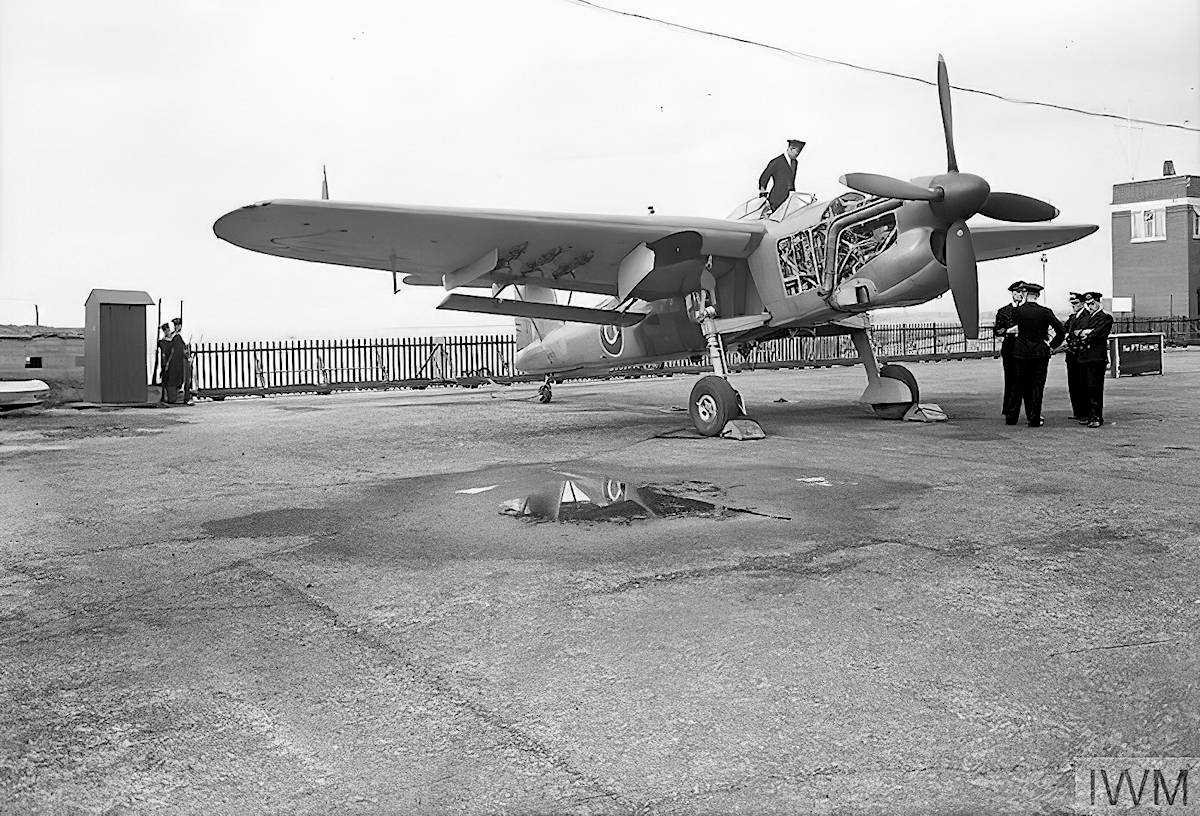
Example of the Fiarey Barracuda under maintenance at RNAS Lee-on-Solent. © IWM A 19272
The squadron moved into RNAS Lee-on-Solent on July 1st 1944 where Lt. (A) K. Lee-White RN took over as commanding officer, also on this date ’B’ flight formed as a Tactician Trials flight equipped with Firebrand F.Is but this was redesignated No.708 Squadron on October 1st. A second detachment, a Torpedo Trials Flight, operated from RNAS Machrihanish, the largest of these trials started on September 27th 1944 when aircraft carried out net defence trials in the Clyde. On completion of these trials the flight was absorbed into 778 Trails squadron at RNAS Arbroath.
The squadron received its fourth commanding officer on November 5th 1944 when Lt. (A) G. A. Donaghue, RNVR arrived; he was one of only two squadron pilots to have a recorded flying
incident, while at
RNAS Machrihanish on a very icy January 22nd 1945, his Avenger slid forward out of control with its brakes fully on when the chocks were removed. The other was at
RNAS Lee-on-Solent on June 22nd 1945 when Sub-Lt J. Incley,
RNVR had to make an emergency landing in Barracuda LS799
after a hydraulic leak, he hit an air raid shelter on
landing.
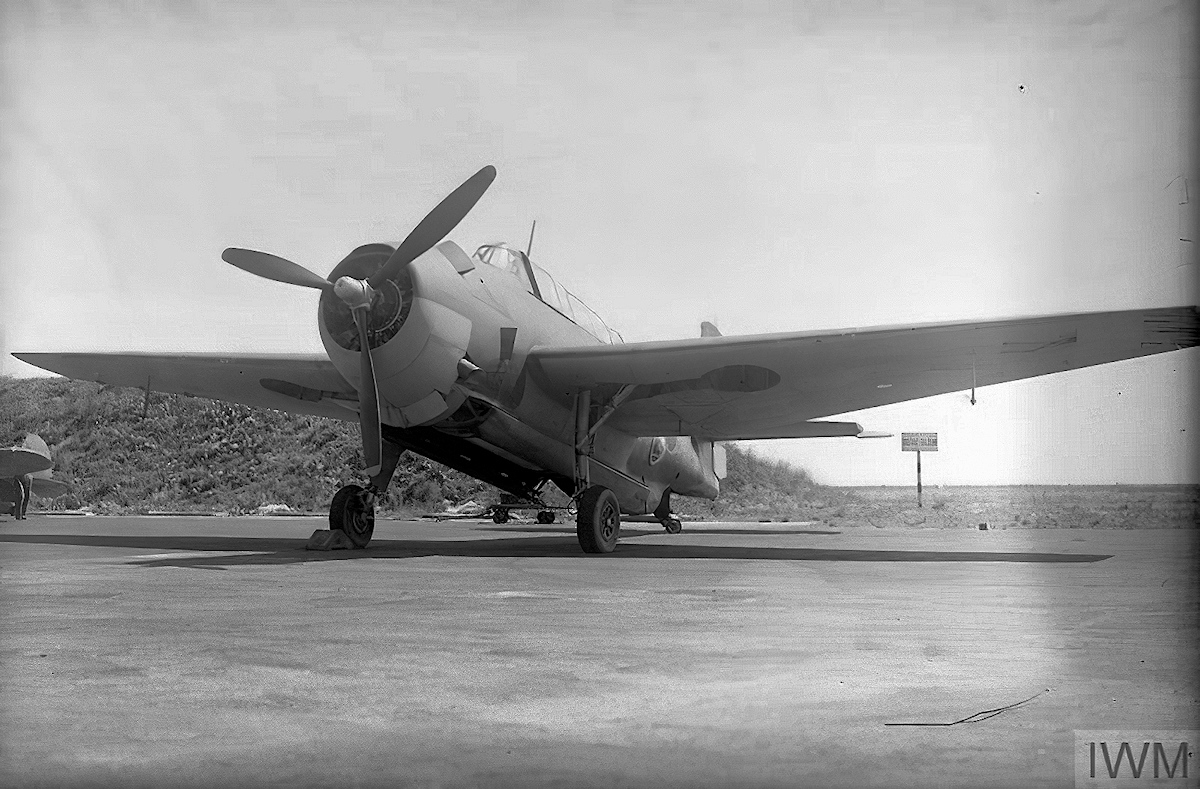
Example of the Grumman Avenger at RNAS Lee-on-Solent. © IWM A 19272
The whole squadron was back at RNAS Lee-on-Solent by the end of May 1945 and Captain D. B. L. Smith, Royal Marines arrived to take over as CO on June 3rd. Several Firefly Is were received in June for familiarisation on the type prior to their planned addition to the squadron’s inventory but permanent issue was cancelled when it was decided two disband the squadron. 764 squadron disbanded at RNAS Lee-on-Solent on September 1st 1945.
No.764 squadron next reformed at RNAS Lossiemouth on May 18th 1953 by redesignating No.766 Squadron ‘A’ flight as an Advanced Training squadron. Under the command of Lt. Cdr P. S. Brewer RN, it operated the existing inventory of Seafire XVIIs and Firefly T.1 and T..2 dual trainers as the Part 1 (Fighter) course of the Operational Flying School.
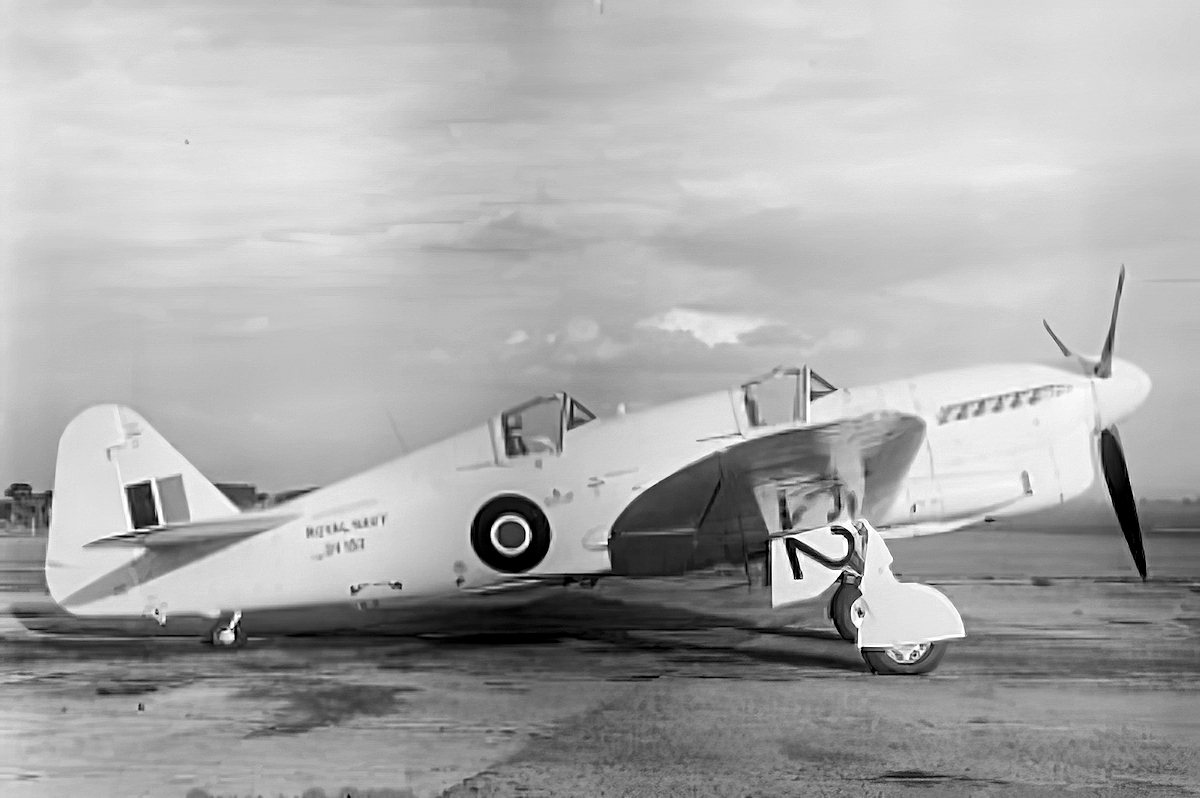
Example of the Fairey Firefly T.1 trainer © IWM (ATP 16304C)
The squadron moved to RNAS Yeovilton on September 23rd 1953, where a new commanding officer, Lt. Cdr B. Bevans DSC, RN took over on the 28th. In May 1954 the first jet aircraft were added to the inventory in the form of the Sea Hawk F.1 alongside 13 Seafires and 6 Fireflies.
The squadron disbanded at Yeovilton on November 23rd 1954.
No.764 next reformed on February 1st 1955 at RNAS Ford as a Fighter Pilot Holding Unit under the command of Lt. Cdr D. F. Battison RN. Equipped with 10 Sea Hawk F.1 and F.2ss and 10 Sea Vampires including some T.22 dual trainers, it gave continuous flying to pilots awaiting appointment to first line squadrons, and also converted USA-trained pilots to British procedures. The Sea Vampire T.22s were equipped to train pilots in all forms of fighter combat and ground attack.
In May 1955 two Wyvern S.4 were added to give type conversion to pilots who had completed their operational training, before joining a first line squadron. Sea Hawk FB.3s began to arrive in March 1956; on March 1st part of the squadron became No.767 Squadron taking with it some of the Sea Hawk F.2s to become a Fighter Pilot Pool Squadron. In February 1957 the Wyvern element also became independent, as the Wyvern Conversion Flight.
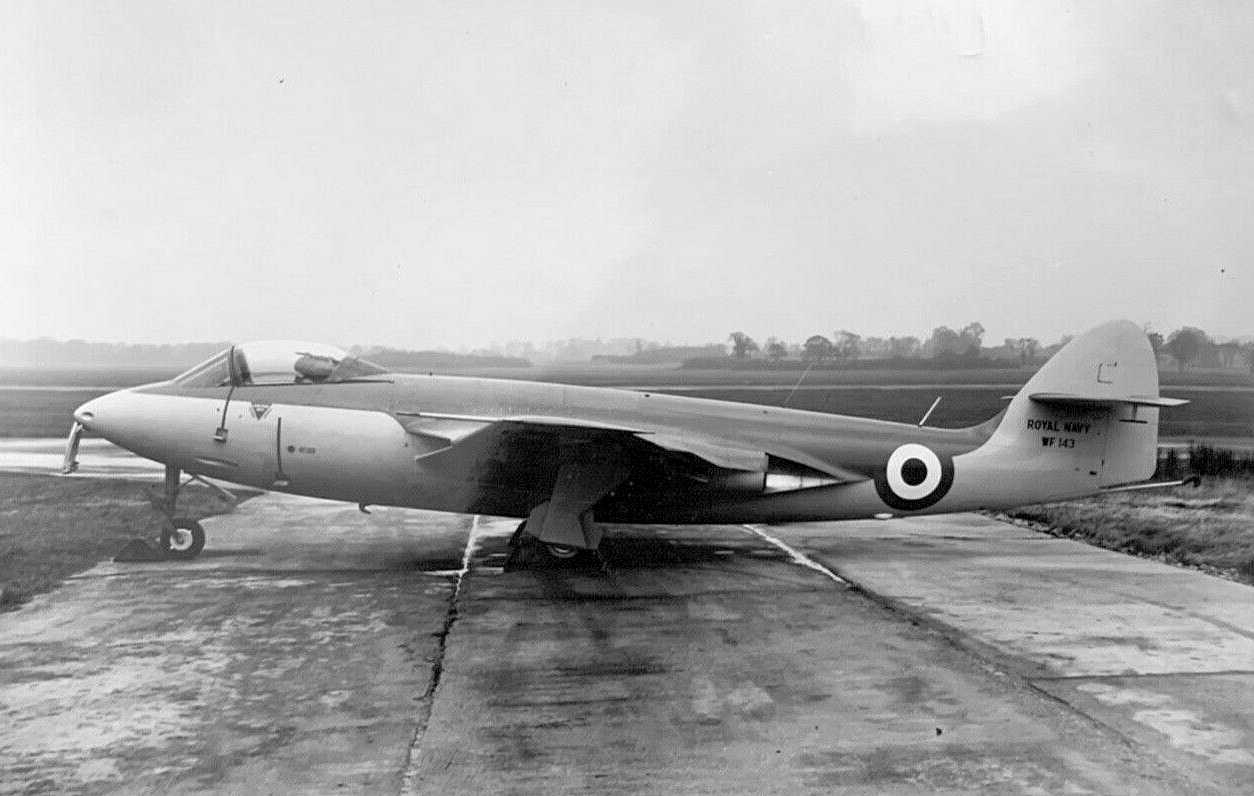
Example of the Hawker Sea Hawk F.1
On June 21st 1957 the squadron moved to
RNAS Lossiemouth leaving behind its Sea Vampires and the Sea Hawk F,I and F.2s, receiving new Sea Hawk FGA.4s
in July. With this move its role changed to comprise of an Air
Weapons Training Flight, a Commanding Officers and Senior Pilots
Designate Course, a Jet Fighter Pilot Pool and a Target Towing Unit.
The squadron operated out of RNAS Milltown, the satellite airfield
for
RNAS Lossiemouth. Meteor T.7 two-seat trainers were received in December 1957 but were withdrawn in March 1958 but Sea Hawk FGA.6s were received that October. Beginning in December 1958 Hunter T.8 two-seat trainers began to arrive, and the Sea Hawk were gradually withdrawn the last leaving in July 1959. A few Scimitars were received in February 1959 but these departed in May and by August the squadron equipment comprised 12 Hunter T.8s.
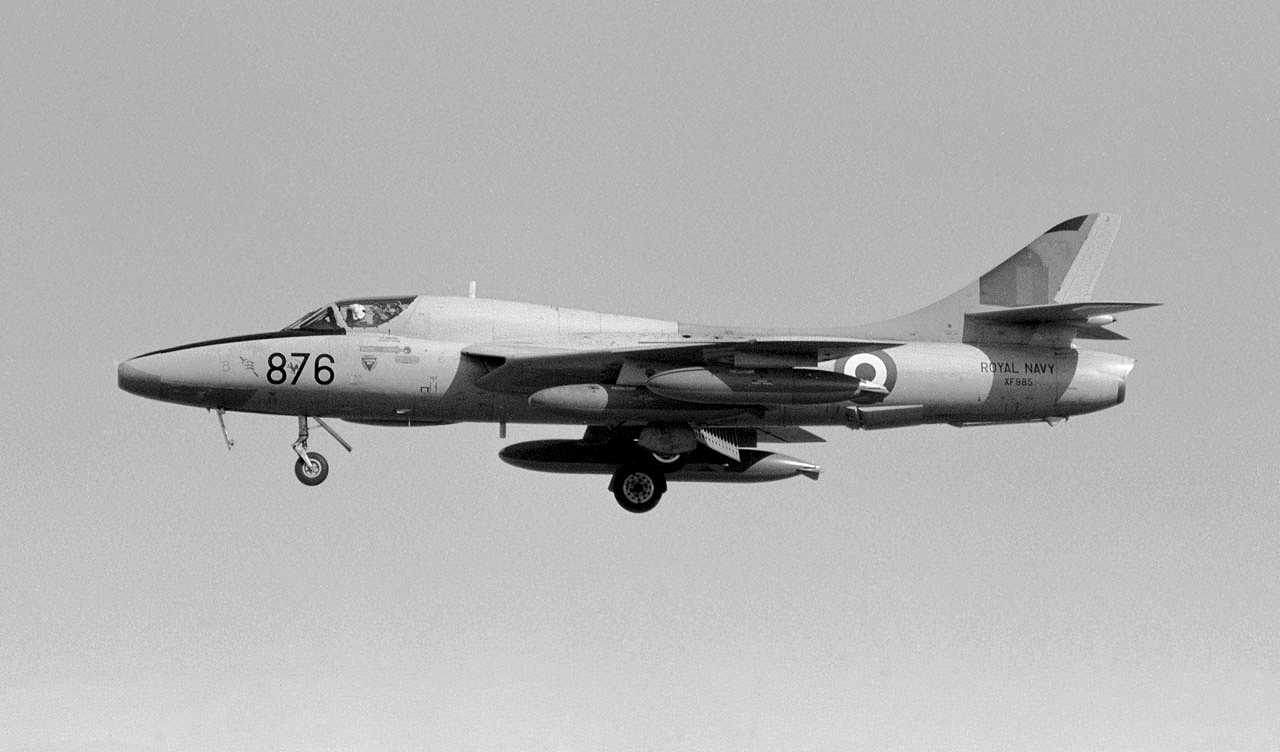
Example of the Hawker Hunter T.8 two seater traininer.
The squadron’s main task changed again from March 1959, its main task became Air Warfare Instructor training; the Commanding Officers and Senior Pilots Designates Course was retained, but a mew third task was Swept Wing Conversion to Hunter T.8s. From July 1962 some of the Hunter T.8s were replaced by Hunter GA.11s; a few of these were later converted to PR.11s. Three Hunter T.8Bs arrived in 1968, and later a few T.8Cs were also used.
On March 26th 1965 No.764B Squadron was formed from the remnants of No.736 Squadron; this squadron was operating Scimitars as part of the Naval Air Warfare and Strike School and these aircraft were passed to 764B. On the same day 736 reformed and reequipped with Buccaneer S.1s from 809 squadron. Under the command of Lt. Cdr J. Worth RN, 764B had been formed solely to train Airwork pilots to fly the Scimitar, disbanding in November on completion of this task.
No.764 continued operating a complement of 10 Hunter GA.Ils and 4 Hunter T.8Cs from Lossiemouth/Milltown until it disbanded on July 27th 1972.
Content revised: 23 October 2022
Additional sources:

Experientia expertus
(Tested by trials)
Approved 1945
None
764 (1)
Seafox I Apr - Nov 1940
Swordfish I/SP Apr 1940 - Sep 1941
Walrus Apr 1940 - Nov 1943
Kingfisher I Jul 1942 - Nov 1943
764 (2)
Barracuda II Feb 1944 - Aug 1945
Avenger II Feb 1944 - Apr 1944
Firefly I Jun 1945 - ?1945
Seafire XVII ? 1945 - Aug 1945
764 (3)
Seafire XVII May 1953 - Nov 1954
Firefly T.1 Nov 1953 - Nov 1954
Firefly T.2 May 1953 - Nov 1954
764 (4)
Sea Hawk F.1 May 1954 - Jun 1957
Sea Hawk F.2 Feb 1955 - Jun 1957
Sea Hawk FB.3 Mar 1956 - Jan 1959
Sea Hawk FGA.4 Jul 1957 - Jul 1959
Sea Hawk FGA.6 Oct 1958 - Jul 1959
Sea Vampire F.20 Jun 1955 - Feb 1956
Sea Vampire F.21 Jul 1955 - Mar 1956
Sea Vampire T.22 Jan 1955 - Jun 1957
Wyvern S.4 May 1955 - Feb 1957
Meteor T.7 Dec 1957 - Mar 1958
Scimitar F.1 Feb 1959 - May 1959
Hunter T.8/T.8b/T.8c Dec 1958 - Jul 1972
Hunter GA.11/PR.11 Jul 1962 Jul 1972
764 (1)
Lt. Cdr (A) F. E. C. Judd RN, 8 Apr 1940
Lt. Cdr (A) H. L. McCulloch RN, 16 Jul 1940
Lt. Cdr (A) H. Wright RN, 17 Oct 1942
Lt. Cdr (A) J. O. B Young RN, 16 Jun 1943
Squadron disbanded 7 Nov 1943
764 (2)
Lt. (A) E. D. J. R. Whatley RN, (temp) 19 Feb 1944
Lt. (A) D. L. R. Hutchinson RNVR, 19 Apr 1944
Lt. (A) K. Lee-White RN, 1 Sep 1944
Lt. (A) G. A. Donaghue RNVR, 15 Nov 1944
Capt. D. B. L. Smith RM, 3 Jun 1945
Squadron disbanded 1 Sep 1945
764 (3)
Lt. Cdr P. S. Brewer RN, 18 May 1953
Lt. Cdr B. Bevans DSC, RN, 28 Sep 1953
Squadron disbanded 23 Nov 1954
764 (4)
Lt. Cdr D. F. Battison RN, 1 Feb 1957
Lt. Cdr J. W. Ayres RN, 15 Apr 1957
Lt. Cdr D. T. McKeown RN, 17 Jun 1957
Lt. R. M. P. Carne RN, 20 Apr 1959
Lt. Cdr J. C. Mather RN, 2 Dec 1960
Lt. Cdr J. N. S. Anderson RN, 7 Jan 1963
Lt. Cdr G. W. G. Hunt RN, 31 Aug 1964
Lt. Cdr M. F. Kennett RN, 22 Nov 1965
Lt. Cdr E. Cope RN, 1 May 1967
Lt. Cdr R. J. Northard RN, 6 Sep 1968
Lt. Cdr R. W. Edwards RN, 6 May 1970
Squadron disbanded 27 Jul 1972
None
© 1999-2025 The Royal Navy Research Archive All Rights Reserved Terms of use Powered byW3.CSS
Press F5 to refresh the page after posting your comment or to hide the form
Watch the gun camera footage from his course Click here
Close
Comments (1)
Joined RNAS Lossiemouth on 6th January 1964 from basic training at HMS Ariel, first squadron as a young JEM (A) was 809 Buccaneer Mk 1's did QM/QS training then spent time on 764 working on Hunter GA 11 and T8's until transferring back to 736 Buccaneer MK 1's. Supposed to be 5 year type drafting on same aircraft, however August 65 drafted to RNAS Yeovilton 766 squadron Sea Vixen FAW MK 2's from there drafted to 899 squadron HMS Eagle November 1965. Great days wish I had this time over again.